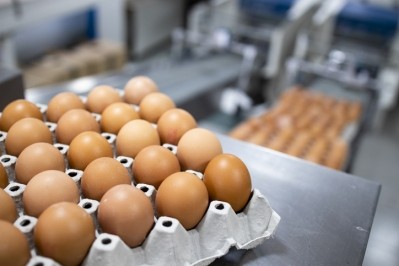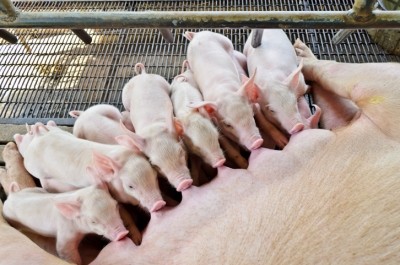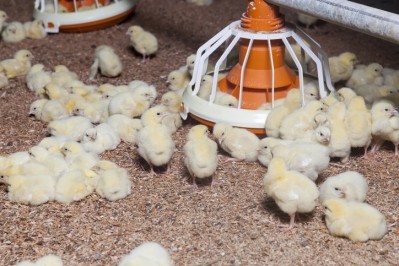Moist diets at an early age stimulate feed intake in broilers, finds research

One of the major developments in the gastrointestinal tract (GIT) of young poultry post-hatch is the maturation of the immune system, and a research team led by René Kwakkel from the animal nutrition group of Wageningen University in the Netherlands finds that giving wet feed early on to young broilers shows promise in terms of stimulating early feed intake.
A moist or wet diet should predispose the GIT towards better development, should see an improved innate immune response, a quicker balanced microbial ecosystem, and hence, better bird health status, said Kwakkel, who will be speaking about this topic at Young Animal Nutrition 2020 (YAN20).
Moreover, by using moist non-human edible co-products, such diet types can reduce the pressure on the competition over agricultural land for either feed or food production, he argues.
Diet and digestive physiology
In terms of the poultry focus at YAN20, other speakers include Dr Emily Burton, associate professor in sustainable food production, at Nottingham Trent University. She will be talking about the ways to optimize the interaction between diet and digestive physiology in young birds.
Professor Richard Ducatelle, head of the laboratory of veterinary pathology, the University of Ghent is also speaking at YAN20. His presentation will explore the mechanisms by which feed additives and feed processing can improve bird gut health and digestion, as well as absorption of nutrients during the starter phase.
The needs of slower growing birds
Dr Ellen van Eerden, poultry nutrition researcher at Schothorst Feed Research in the Netherlands, will be taking us in slightly new direction in terms of focus at YAN20.
She says: "Nutrition and the immune system are inseparably linked to each other. Until now most research in these areas has been carried out with fast growing broiler breeds, but with the increasing presence of slow growing breeds on the market, there is a need for a better understanding of the interrelationship between nutrition and the immune system in this type of bird."
Her presentation will show results from a recent project and summarize current knowledge on this topic, evaluating the
- Different nutritional requirements for slow growing broilers
- Different immune coping strategies between efficient and non-efficient pullets could also apply to fast and slow growing broilers, and that the
- Combination of feeding and vaccination strategies can have a synergistic effect on performance and health status
Embryonic stage
Dr Elijah Kiarie, assistant professor, the university of Guelph in Canada, is joining us in Amsterdam. He says that, despite advances in genetics and management, metabolic and skeletal disorders are common among commercial poultry, leading to high mortality rates and large financial losses for producers. The situation is further exacerbated by increasing restrictions on antibiotic growth promoters used to make birds resilient to intensive production processes, he notes.
At YAN20, he will reveal the findings of new research into perinatal nutrition and the lifelong impact of feeding breeding poultry and their progeny with functional dietary components, namely ω -3 fatty acids (FA) and yeast derivatives.
Home comforts
David Speller, owner of the Applied group, is involved in the management of broiler farms. His talk at YAN20 will focus on how rearing conditions are key to ensure optimal utilization of feed for a young broiler chick.
He says young chicks are dependent on the farm and the farmer for their wellbeing, comfort and health, and that different farms, different genetics, may all require different optimal conditions. “We must embrace nutritional and technological developments for optimal feeding of young chick.”
Next generation probiotics
Dr Ivan Rychlik, leader of the salmonella research group at the Veterinary Research Institute in the Czech Republic, will be speaking at YAN20 about to develop what he terms ‘next generation’ probiotics.
He and his team have been examining chicken and pig gut microbiota with special emphasis on the identification of chicken gut microbiota bacteria that restrict Salmonella and Campylobacter colonization and pig microbiota bacteria that increase piglet resistance to Clostridium perfringens.
It is rather surprising, he says, that microbiota transfer between a hen and chicks has not been addressed in a significant way to date, when recent developments in next generation sequencing allow for such exploration.
The knowledge obtained, he said, can be used to identify bacterial genera which are efficiently transferred from hens to chicks followed by their isolation in pure culture. Administration of pure cultures of such isolates or their mixtures should then mimic the natural transfer from a hen to chicks and improve the gut health of the chicks from the very first days of life. However, this can be achieved only using an evidence-based approach, reflecting principles of natural microbiota transfer between a hen and a chick, he said.
Rychlik and his team have been researching microbiota transfer between a hen and chicks and identifying isolates or their mixtures that may mimic that transfer.
“We have a lot of new data from field trials in chickens administered our probiotic mixtures and trials are ongoing,” he told us previously.
“In addition, we have started to produce data of a similar nature in piglets,” he said.















